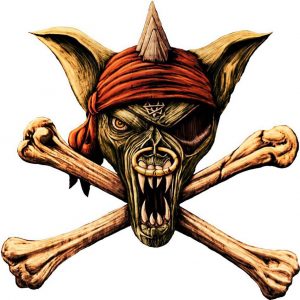
Back from exile, RUNNING WILD returned in 2013 more ‘RESILIENT’ than ever. LOUISE BROWN traced his career from the very first hammerblow to the legacy ROCK ‘N’ ROLF continues to forge in Iron Fist #7, republished here as we blast their latest album ‘RAPID FORAY’ into the new year…
“You know, Running Wild is still here, it’s been 35 years, next year, so I must be resilient,” says a defiant Rolf Kasparek, aka Rock ‘N’ Rolf, guitarist, frontman and Cap’n of the band who formed in 1979. We’re sat at his label’s studio in Hannover, Germany, where select journalists have been invited to hear the band’s newest album, ‘Resilient’, Running Wild’s 15th album, and second since Rolf got back on the ship after a seven year break (bar an explosive “final” show at Wacken 2009).
Kicking off with ‘Soldiers Of Fortune’, the new album comes with as much roaring thunder as ‘Soldiers Of Hell’, from their 1984 debut full-length ‘Gates To Purgatory’, and marks a fist-raising return for the Gods of the Iron.
Hoist the flags. The tyrants of the waves are coming back on shore and have a veritable booty of diabolic force to dish out. Rolf looks meaner than ever, talking as fast as his riffs, excited to be back at the helm of a music scene he helped forge in the early ’80s.
“I liked the word and the meaning behind it,” he says of ‘Resilient’. “That’s why I chose this cover and that’s why I chose the title, because it says it all – we’re still here, with a little break, but still here and 35 years is a long time.”
The cover will be delight for long-time Wild fans. Mirroring their second album, 1985’s ‘Branded & Exiled’ or their ’81 ‘Rock From Hell’ demo, the artwork is simple and to the point. There’s their mascot, Adrian Son Of Satan, back at the fore, nothing else needed! Almost as if he’s screaming their return from the choppy waters of an uninspired end of career that saw a tired and exhausted Rolf hang up his pirate hat in 2005 and a slow start with last year’s ‘Shadowmaker’. Running Wild are one of those bands that fans idolise, and get name-checked as an influence across newer sub-genres in metal from death, black and thrash, but many disregard them as a gimmick or worse, as just another ‘Only Big In Germany’ power metal act. ‘Resilient’ will set everyone straight. Running Wild are one of the most important bands in the heavy metal universe.
“I started writing the material around March. ‘Soldiers Of Fortune’, which is the first one, it just came around in five minutes, and then I was going on with the next song,” Rolf reveals about how inspired he’s feeling right now. Where most bands spend years between albums, Rolf is back at his old tricks, back to having an album out a year, pretty much like he did between ’84 and ’95. “It just kept coming. All these songs just came out on a roll. Everything came out naturally and that is why it’s so fresh.”
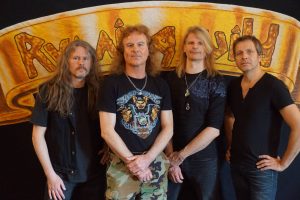 It almost sounds like it was an effortless process, which belies the strength of the record. Most bands who fret over an album for years don’t manage to strike gold like Running Wild have on ‘Resilient’
It almost sounds like it was an effortless process, which belies the strength of the record. Most bands who fret over an album for years don’t manage to strike gold like Running Wild have on ‘Resilient’
“Yeah,” he laughs, when asked if was maybe all too easy. “But I’ve been doing this for nearly 40 years. I started out writing songs when I was 14, when my English was awful.”
You could maybe accuse Rolf of churning this out, of not caring, but after just one spin of the album, we get the sense that it couldn’t be further from the truth.
“If it’s happening fast, it should still feel right,” Rolf explains. “You can also write an album very easily that sucks. Writing is an emotional process, I have to feel that everything is right, and if I don’t feel it, it’s obviously not a good song.”
So were there some songs that got thrown in the bin?
“Maybe some ideas. Don’t just do it to put a song out there, put it away and keep it for the next album. So, for this one I just wrote these 12 tracks and there were some ideas I put away for the next time.”
Next one? It seems Rolf is already on a roll.
“Yes, I had a different idea for ‘Bloody Island’ so I put it away,” he continues, going on to tell us a bit about the themes on the new record. “I figured it needed an intro and I discovered this melody, which doesn’t appear in the song again. I was recording the first guitar for that, just the acoustic guitar, and then we got the idea for the choir. I call it the choir of lost souls, because it’s what happens in the song. ‘Bloody Island’ is a pirate song but if you look behind it it’s about greed and losing your soul, so it’s a symbol for today with the way people behave.
“And for ‘Crystal Gold’, for example, sometimes I’ll read something, like I read that they wanted to privatise drinking water. [The governments] just want to control the people and take away their freedom, so I said, ‘We have to write a song about that’ because it’s very important. Water is life, without water nothing exists. I don’t want to preach or anything like that, I just want people to take a look at some of the stuff that I have to say.”
Not all Running Wild songs are political statements, and even the ones that are still go down a storm with the festival crowds. And while it’s great to hear that Rolf is using his position as one of the most respected metal frontmen to spread a message, ‘Resilient’ is also not without its classic chorus-driven classics that Running Wild are famous for. ‘Chains & Leather’ and ‘Under Jolly Roger’ are two songs that immediately spring to mind when you start compiling a list of heavy metal anthems and Rolf insists he will never turn his back on the power of the simple riff/chorus formula.
“On most of the classics, most of them were written in a very short amount of time. ‘Under Jolly Roger’ only took me half an hour, the lyrics were very basic and it became such a great classic,” he admits with a laugh. “And there are songs that you work on for days after days and it’s just an okay song. Why? You can’t make up why, it’s just the right moment and the right song. Like ‘Denim & Leather’. Like ‘Breaking The Law’. It’s just one riff. It’s simple but it’s great.
“It was very hard work though,” he continues of the process of making this killer cut. “Seven days a week, 12 hours a day. For sure, I had two sound engineers working with me and I recorded the vocals while PJ [Peter Jordan, Rolf’s musical partner-in-crime] was working on the drums and we recorded everything from that in different studios, working together at the same time. It was like teamwork.”
Was it just you writing, Rolf?
“Yeah. It makes it a lot easier, you don’t have to fight with anyone else and it’s a luxury for sure. When you’ve been doing this for as long as I have you know how to do it and how to work yourself. I tried in my career to write songs with other musicians and the songs I wrote together with them are not as good as when I write alone. Some guys are really perfect when they work together but it doesn’t work with me.”
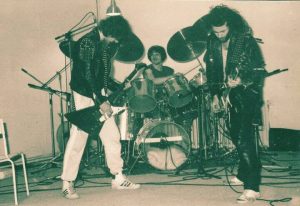 Enough blathering on about how ‘Resilient’ is a contender for album of the year, you can make your own mind up about that. We jumped at the chance to interview Rolf so we could ask him about his influences and his influence on the music we love. He was more than happy to wax lyrical about forging his own path in a genre that didn’t even exist when he started the band in the mid-’70s.
Enough blathering on about how ‘Resilient’ is a contender for album of the year, you can make your own mind up about that. We jumped at the chance to interview Rolf so we could ask him about his influences and his influence on the music we love. He was more than happy to wax lyrical about forging his own path in a genre that didn’t even exist when he started the band in the mid-’70s.
“I was listening to music since ’68,” he says proudly. “I had a brother who was five years older and had all the records, and then around 1970 rock came in and when I first heard [Black Sabbath] ‘Paranoid’ on the radio I was 9 years old and I was blown away. This was my stuff! It was the music I was waiting for. And it must have been around ’72 that I made a very hard decision, as I had to sell my train set to buy my first guitar.
“I was playing around on this guitar, with no amplifiers and it became really aware to me that I wanted to do rock music when I was 14 or 15, so we made a band called Granite Heart in ’76 or ’77. We just did one show. It was our Kiss or AC/DC and when we started out with Running Wild it was ’79. We reformed the old band and renamed it Running Wild, because of Judas Priest for sure, because we all loved the band and they were a big influence on us. And also the British bands of the day, and Thin Lizzy too, bands like Kiss, AC/DC and UFO.
“I personally discovered Judas Priest around ’78,” he continues of the group that gave him his band name. “They were on a TV show called ‘Rock Forever’ and I wanted to get their record, so I went to the shop and you couldn’t buy ‘Killing Machine’ so I brought ‘Sin After Sin’ and a week after I brought ‘Stained Class’ and around ’79 the live album came out and I just brought it immediately. I was so blown away, it was such a great sound. Then in 1980 all the bands came around like Iron Maiden, they did support for Kiss. Then came Saxon and Def Leppard. I also saw Thin Lizzy on the ‘Black Rose’ tour with Gary Moore. I was at AD/DC in the Markthalle in Hamburg with just 1000 people.”
Okay, now he’s just showing off!
“I thought I wanna do that,” Rolf smiles. “We didn’t try to copy Judas Priest, we were not that good, so we had to find our own way. Everybody else around that time formed a band. Around ’80 or ’81 all the amateur bands in Hamburg came. By 1982 there was a real upcoming heavy metal scene in Hamburg, we belonged to that and bands came like Helloween. We knew each other for sure because we were from the same town and everybody used to bring each other records saying, ‘This is a great new band, you have to listen to that’ and then ten other people brought it so it spread it around, it was great.”
Running Wild’s members list on Metal Archives reads like a who’s who of Teutonic terror, there’s Jorg Michael of Rage and Stratovarius, Matthias Liebetrith who played with Scorpions, Thilo Hermann from Holy Moses, Bodo who played with U.D.O, Stefan Schwarzmann from Accept – these are all legends in their own right, but it also shows a raw ride for Rolf when it comes to keeping a band together, probably why he’s a bit of a lone wolf these days. But the band was formed, in the usual way, by four friends; Rolf, Hasche (drums), Matthias Kauffman (bass) and Uwe Bendig (guitars).
“At first it was with some guys from my class,” Rolf recalls, “but then we changed schools and we changed the band but kept the name. Just the guitarist [Uwe Bendig] and me stayed but then he also went away and me and the drummer, Hesche, started working on ‘Gates To Purgatory’ and we were looking for new members and we found Preacher [who is now, ironically, actually a preacher]. Then we found Stephan Borris as a bass player. We had around three different bass players that we could chose from and two were really great and one really couldn’t really play bass, but he looked right and he wanted to do the music we did so we said, ‘Okay, you’re right’ and the other guys were like ‘What?!‘. It was about the passion. We were a really great band together and the four of us really wanted to make it. The manager for Helloween was in contact with all the magazines that were into heavy metal around that time, so he gave us all the addresses that we could send our demo to. We really tried to build up a scene by sticking together so it was not like one band against the other. It brought everyone together.”
Those early Running Wild demos are essential listening, especially if you want to trace the lineage from heavy rock and early heavy metal to the many myriad genres it spawned. Running Wild were onto something right off the bat. Between 1981 and the first album in 1984 they made the ‘Rock From Hell’ demo and three further demos that they would hand-tape at home to try and get the attention of the music press and gig bookers. It wasn’t long before heavy metal dreamweaver Karl-Ulrich Walterbach took notice. It was around this time that he was starting Noise Record and agreed to help the band.
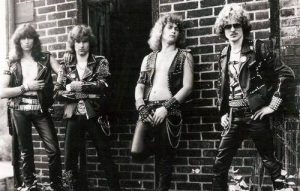 “He wanted to do a full record with us and we first did the ‘Rock From Hell’ sampler, which we put two songs on [‘Adrian’ and ‘Chains & Leather’], and he said, ‘Okay, I really want to do a second sampler with you called ‘Death Metal’ because I’ve got this new act Helloween that I want to make known to the people.”
“He wanted to do a full record with us and we first did the ‘Rock From Hell’ sampler, which we put two songs on [‘Adrian’ and ‘Chains & Leather’], and he said, ‘Okay, I really want to do a second sampler with you called ‘Death Metal’ because I’ve got this new act Helloween that I want to make known to the people.”
Yep, ‘Death Metal’. That split has gone down in history, not because it was some of the earliest output for Running Wild, Helloween and a young Swiss band called Hellhammer, but because it was (here come the arguments…) the first time that phrase was used. A whole year before Possessed. Okay, not that Running Wild or Helloween inspired the genre, we get that! “We didn’t think about that,” Rolf laughs when we ask him about the impact of the name. “The idea came from Hellhammer. It was just really great for us and really great for Helloween. But we saw the cover and said, ‘Oh no, you can’t do that with all the zombies’, but because it was a possibility to get known we said, ‘Let’s do it’.
So, you’re definitely not death metal?
“[Laughs] No, absolutely not! I never listened to death metal, it’s not my music.”
What happened to the fourth band on the split, Dark Avenger?
“[Laughs] I never heard about them again. There were so many bands coming up and then disappearing again. We’re still here. This is the main point.”
The same year as the ‘Death Metal’ split came a further demo, this time a compilation of all their early songs called ‘Heavy Metal Like A Hammerblow’. Despite being one of the greatest titles in all of heavy metal history it also cemented the use of the band’s mascot, Adrian.
“Originally, the cover of that was the poster we did for announcing our shows as we didn’t have the money to do anything else,” Rolf recalls of how Adrian arrived on the scene. “We said, ‘Use it for the demo to make us known to all these journalists’, because in those days it was impossible for a heavy metal band to get any notice from any normal magazine.”
You did artwork yourself?
“I had to! We didn’t have any money to pay for that. I thought we needed something you put a mark on. Iron Maiden has Eddie so I said, ‘Okay, let’s try something’ and it came out like that. It’s Adrian The Son Of Satan because we played around with that stuff at the time. We’re not Satanists, but when we figured out some people were afraid we put it away because we were misunderstood. I did that head just to have a brand for the band, like Motörhead. We didn’t want to create a different kind of religion, it’s not what we intended, we were pretty much coming from a political side, we just used Satan as a rebel figure.”
Going back to talking about how Priest and AC/DC shaped a young Rolf’s world, what about the bands that claimed him as an influence, or of the changing shape of the metal world in 1983/1984, clearly an exciting period in the development of the genre – it was the year that gave us ‘Bathory’, ‘Morbid Tales’, ‘At War With Satan’, ‘Don’t Break The Oath’, ‘Ride The Lightning’, ‘In The Sign Of Evil’, ‘Haunting The Chapel’, and ‘War And Pain’! Was Rolf keeping check on what was happening around him?
“I was still buying records, yes, but the funny thing is, even though we were doing fast songs, I never listened to speed metal. It’s not my music, it never was. I was more into hard rock and heavy metal, even if I look in the ’80s what I was listening to it was Cinderella, WASP, stuff like that – that was my type of music and it still is. It was interesting to see the different directions people were going in but for me it was always this classic heavy metal and hard rock. There was no metal except Black Sabbath growing up, but I was listening to all sorts of music. When I was a kid I listened to all this glam rock, stuff like T-Rex, Sweet, Slade was my favourite, Status Quo, stuff like that. My first record was ‘Piledriver’, I was 11. It was my first album, I had some singles but it was my first album.”
We lose him for a second as he starts singing ‘Paper Plane’, but bring him back to ask him about his influence on black metal, of which they have been name-checked many times as a pioneer. Does he agree?
“I know that,” he says firmly. “These bands really claim Running Wild is a big influence in getting them into music. There’s so many different bands, especially in Germany. We have this punk band in Germany called Donots and the singer says ‘I’m doing rock music because I was a Running Wild fan’. They did a cover version of ‘Bad To The Bone’ and I was several times on stage with them playing punk rock, it was great to see that they have the influence but are doing their own stuff.
“We were not influenced by the music but definitely by the look,” he continues on the subject of whether he ever paid attention to Venom or Bathory. “Even if the people see ‘Gates Of Purgatory’ as the first thrash metal or black metal record we never figured ourselves to be that, we were just playing not as good as we wanted to.
“As for the look, well, we wanted to have a big show because we said we wanted to make the biggest impression on the people that we could do with the money we had, and the record company saw that too and they said they would give us the money. So, it was really great for us and a big part of our success, the pyrotechnics and the leather and studs – no one had as much leather and studs as we had.”
On that success, it’s hard to believe now, in a world where a new heavy metal band barely sells 2000 copies of a debut record, that Running Wild sold 25,000 copies of ‘Gates To Purgatory’ in just two months.
“Straight away, we belonged to the big league in Germany,” Rolf remembers. “Everything was going really quick and I remember sitting there and thinking ‘You’re a rock star, you really made it, you always wanted this and it happened’. It was a great feeling.”
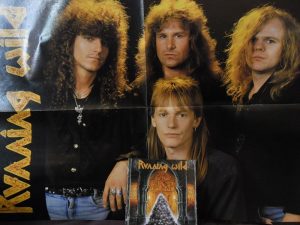 The band went straight back into the studio and made their second album ‘Branded & Exiled’ but by 1987 they’d had an image shift that would change their lives forever.
The band went straight back into the studio and made their second album ‘Branded & Exiled’ but by 1987 they’d had an image shift that would change their lives forever.
“It just came around,” he says of how the band became known as The Pirate Metal band. “I figured that ‘Under Jolly Roger’ sounded great and came to the rehearsal room and said, ‘Okay, I have an idea for a song, it’s about pirates’, and I played it to them and they said, ‘Wow, let’s call the album ‘Under Jolly Roger’. I said, ‘Okay, but the cover has to have something to do with pirates’ and someone else said to put a ship on it and someone else in the band, I don’t know who it was, said ‘Let’s paint ourselves in pirate clothing on the back cover’ and the guy who did the illustration said, ‘Oh that’s great, perhaps the stage set should look like that’, but we couldn’t wear our leather stuff so we said, well maybe we should look like pirates. Most of the journalists said it was ridiculous but after that it was all ‘The pirate band, Running Wild’ and it worked. It had a very special brand for the band.”
It’s been a theme that has followed the band right through until today, with many of the songs on ‘Resilient’ dealing with tales of high sea treachery.
“I never tried to do a full record about this stuff,” Rolf is quick to point out though. “I think the record with the most pirate stuff was like five songs, and on one record, ‘Blazon Stone’, there’s no songs about pirates. Nobody noticed, so I never felt forced to write about it.
“When I was preparing for ‘Port Royal’ [1988] I read a lot of books about it and became interested in, not the cliche Hollywood guys, but how they lived, the reasons there were pirates,” he says of his own personal fascination with the subject’ “Pirates were the first democratic republic. They really had laws and it was great to see that they were totally different from what was shown in the pirate movies. The reason they did it was freedom because they had no other chance to be free and if you look closer you have to ask, ‘who is more criminal? The pirates or the governments?’ I don’t think it was the pirates.”
As it gets closer to the witching hour, we start to wrap up our conversation, but in order to bring things up to the present day we have to ask about the big elephant in the room… and that is the period between 2009 and 2012 where the band, to all intents and purposes, had officially called it quits. After a triumphant blow out at Wacken in 2009, Running Wild were pronounced dead. They’d not recorded an album since 2005’s ‘Rogues En Vogue’ and it was thought the band had joined Davey Jones’ locker for good. But 2012 saw the release of ‘Shadowmaker’ and Rolf has been on the fast-track since. It was only three years between the goodbye show and the new album, so we have to ask, was the split for real?
“At the time, yes,” Rolf says without hesitation. “See, when we finished the tour in 2005 I figured I wasn’t happy because when I did ‘Rogues En Vogue’ it was so hard for me to write the songs. It was a painful process. I thought to myself, ‘There’s something wrong, you can’t do this’ and around 2006 we started a fun project, Toxic Taste, and when I was writing songs for this band I wrote, in two months, about 80 songs! I thought, ‘Wow, this is songwriting’ and when I look back on it now I knew I needed to get away from Running Wild. When I did the last show in 2009, I was not sad about it, because really I’d said goodbye to Running Wild two years before.
“But you know, when we started the idea to re-record all the old stuff, the record company said, ‘We need some bonus tracks’. I said I would try and I tried the first song and thought ‘Wow, that is too good to be a bonus track’, so I wrote a second one, and thought ‘No’, again, and it went on and on. I phoned the guy from the record company and said, ‘Let’s talk about a new album!’ One song came after another and the feeling and the fun to write for Running Wild came back. The break was absolutely necessary, I had to do this to find a way back and it worked.”
Don’t expect this to kick-start a long period of touring for the band, though. You won’t see Running Wild walk the plank at your local dive bar… much to our dismay.
“No, not really,” he laughs when asked if touring in a transit van across Europe or the world is an attractive prospect. “When you look at Wacken, we played two times and we got the absolute record. We played in 2003 and normally there’s 55 or 60,000 people but we had 110,000 and in 2009, we had over a 100,000 people, so everybody who was into Running Wild was there and that was really amazing, to reach, on one night, all the people.
“It was around the ’90s when I stopped doing bigger tours because it didn’t work financially. It doesn’t make any sense to me, so today the situation is that I don’t do touring. We broke up in 2005 and on the last tour we did, because of smaller venues, we couldn’t take our own PA or pyrotechnics, so a lot of friends said it was not Running Wild. I said, ‘Okay, if I do Running Wild it has to look like Running Wild; that means a big stage, big lights, big pyrotechnics. So where can I do that? Only on a festival. I have a plan to do festivals in 2014, we get a lot of offers and as far as I know there’s one in England also who are very interested in having Running Wild.”
Say yes!
“I can’t [laughs], not yet, I have to look over all the details after the promotion for this album and see if it fits with our schedule as we want to start on the next album but hopefully we can manage it.”
It is frustrating for us Wild fans. But then again, in all honesty, the band who can play to over a 100,000 metalheads at a German festival would struggle filling a 1000-capacity venue in the UK. Why is it, we ask, that Running Wild have never really had the impact they deserve outside of their homeland?
“We played in London but it was a long time ago. We played the Marquee in 1988. We can’t say we concentrated on Germany but our last record company, Gun Records, they were pretty much only in Germany, we had no impact on other countries.”
Thankfully ‘Resilient’ should go someway to reinstating Running Wild as one of the pioneers of extreme heavy metal and should encourage newer fans to delve into their arsenal. The ripples are already starting to become waves…
“It’s an honour to see that,” he says of his influence on a new generation of metal maniac. “When I first started out I was influenced by Kiss and then Judas Priest and today I’m grateful to them so it’s really great to see that there is another generation coming up claiming that Running Wild has a big influence on them and they are standing there watching us playing live in the same way I saw Judas Priest or AC/DC.”
(originally printed in Iron Fist #7)
Copyright © 2024 Iron Fist Magazine. All Rights Reserved.